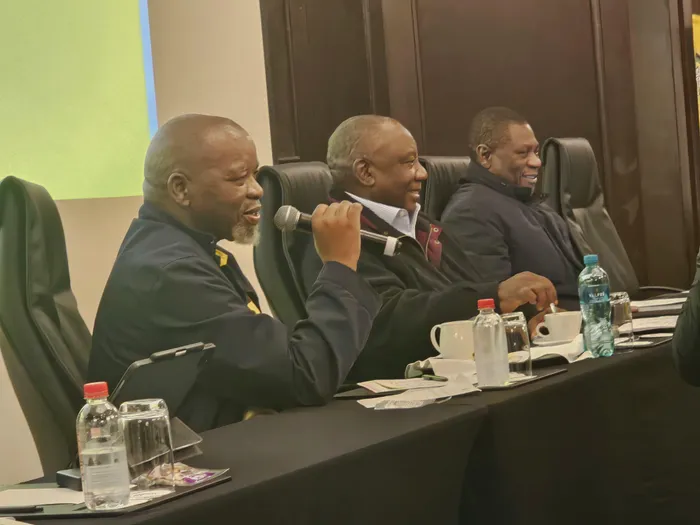SAPS Turmoil: Political Interference Undermining SA's Safety and Security

ANC National Chairperson and Acting Police Minister Gwede Mantashe, President, Cyril Ramaphosa and Deputy President Paul Mashatile. Given the critical role of policing in safeguarding democracy, it is evident that its administration and responsibilities cannot be solely entrusted to politicians, says the writer.
Image: Theolin Tembo/Independent Newspapers
Paul Kariuki
South Africa’s policing history is deeply intertwined with its turbulent past and its ongoing pursuit of justice and equality. Under apartheid, policing was a tool of suppression, enforcing racial segregation and oppressing dissent.
Since the democratic transition in 1994, efforts have been made to reform the police service into a body that upholds the principles of human rights, accountability, and community service. However, the path has been fraught with challenges such as corruption, inadequate resources, and perceptions of bias, which continue to undermine public trust.
The South African Police Service (SAPS) operates within a complex socio-political environment, where political influence, historical baggage, and socio-economic inequalities shape its operations and effectiveness.
Effective policing is indispensable for the deepening and sustenance of democracy in South Africa. It is a fundamental pillar that ensures the protection of citizens’ rights, maintains public order, and fosters safety, essential elements for ensuring societal stability.
Law enforcement that upholds the rule of law without bias reinforces citizens’ confidence in state institutions. Moreover, transparent and accountable policing encourages community participation and strengthens social cohesion. More importantly, when the police serve as neutral custodians of justice, they contribute to reducing crime and related social ills.
Recent developments, such as General Mkhwanazi’s media briefing last week, highlight the risks of compromising policing independence. The briefing revealed internal conflicts and allegations of misconduct, raising concerns about political interference and the erosion of professional standards.
If political agendas dictate policing priorities, there is a danger that law enforcement becomes a tool for suppression rather than protection. Such compromises damage public trust, undermine legitimacy, and risk turning police into instruments of political expediency rather than impartial guardians of the law. This threatens institutional integrity, the very fabric of democracy that depends on justice and fairness.
Given the critical role of policing in safeguarding democracy, it is evident that its administration and responsibilities cannot be solely entrusted to politicians. Politicians may have short-term political interests, which can be at odds with the long-term goal of establishing a fair and unbiased law enforcement system.
Effective policing demands independence, professionalism, and a clear separation from political sway. Oversight bodies, civil society, and the judiciary must work together to ensure that police institutions remain accountable and free from undue influence.
Building a democratic police service requires creating institutional frameworks that promote transparency, vetting personnel thoroughly, and fostering community oversight—elements that transcend political control and prioritise justice over politics.
The establishment of the commission of inquiry by President Cyril Ramaphosa is a crucial step towards fostering greater accountability within the SAPS and the broader government framework. By initiating an independent investigation into allegations of corruption, the president signals a commitment to transparency and justice, which is essential for restoring public trust in law enforcement agencies.
While the public is wary of the Commissions of Inquiry established so far in the last two decades and their limited impact on deterring wrongdoing in the country, the move will serve as a deterrent against unethical conduct, as officials will be aware that their actions are subject to scrutiny, thereby encouraging a culture of integrity and accountability at all levels of SAPS and the broader security cluster.
The citizenry expects that a thorough inquiry will be done to uncover systemic issues and root causes of corruption, enabling more targeted reforms and strengthening internal controls within the police service and enforcing greater accountability. Importantly, the commission’s independence is vital in ensuring that implicated public officials are held accountable and that recommendations will be implemented swiftly to restore citizens’ trust.
While the process alone cannot eradicate corruption, it lays the groundwork for ongoing oversight and reinforces the government’s commitment to fighting corruption comprehensively and transparently.
Furthermore, citizens and the broader civil society play a critical role in the context of policing. Vigilant civic engagement ensures that police accountability is maintained and that abuses are exposed.
As a collective, they should continue advocating for meaningful and sustainable policy reforms aimed at monitoring police conduct, among other aspects. By holding authorities accountable, they will be curbing the risks associated with abuse of power within law enforcement agencies in the country.
In conclusion, safeguarding South Africa’s democracy requires a collective effort that involves political leaders and active citizen participation. Effective, independent policing is a critical pillar that underpins social stability, justice, and human rights. It cannot be left in the hands of politicians alone, whose influence, if unchecked, threatens to erode public trust. Together, we can build a future in which policing is truly a pillar of democracy, not a pawn of politics.
* Dr. Paul Kariuki is the Executive Director of the Democracy Development Program (DDP). He writes in his personal capacity.
** The views expressed do not necessarily reflect the views of IOL, Independent Media or The African.